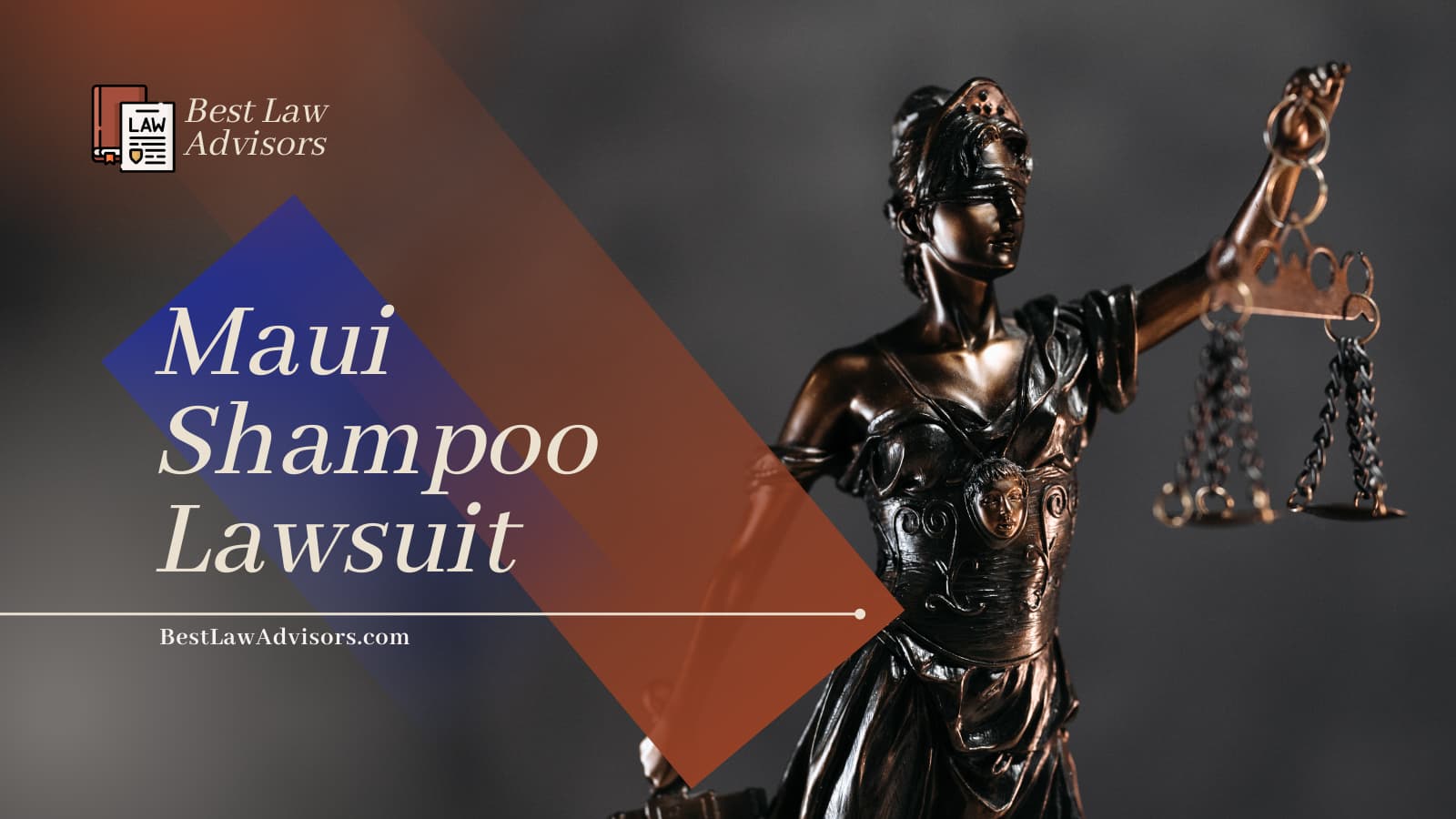Maui Shampoo has long been a popular hair care brand that promises lush, healthy-looking locks using exotic, natural ingredients. However, recent allegations have shaken consumer confidence and trust in this tropical-inspired product.
A lawsuit filed against Maui shampoo claims that contrary to marketing claims, the shampoo contains harmful chemicals that have caused issues ranging from minor irritation to significant hair loss for some consumers.
Maui Shampoo Lawsuit

This in-depth guide on the Maui shampoo lawsuit aims to provide clarity for everyday consumers. We’ll explore key areas of concern, from the background of the brand to the current legal battle.
Most importantly, we’ll discuss what this allegation means for you and your hair care choices.
Overview of Maui Shampoo
Maui shampoo aims to capture the natural botanicals and nourishing properties of Hawaiian island ingredients. With unique formulas across their shampoo range, they promise to deliver healthy, shiny hair with an air of island vibes.
Key aspects that have driven the popularity of Maui shampoo include:
- Marketing as a natural, organic shampoo range.
- Exotic ingredients like Awapuhi ginger, coconut milk, aloe vera, etc.
- Claims of being paraben and sulfate-free.
- Vibrant, attractive packaging sums up tropical locales.
- Affordable pricing.
Consumers responded well to the idea of an island-made shampoo that could provide salon-like hair without harsh chemicals. Over two decades, Maui built itself into one of the top five shampoo brands in America.
Which makes the current allegations all the more concerning for long-time users.
The Allegations Against Maui Shampoo:
In 2022, a class action lawsuit was filed against Maui Moisture, the parent company behind popular Maui shampoo products. The lawsuit makes two major claims regarding issues with the shampoo:
Ingredient issues
- Maui shampoo products allegedly contain chemicals like formaldehyde, propylene glycol, ethoxylated ingredients, etc
- These ingredients can cause irritation, allergic reactions, or significant hair damage
- The inclusion of such chemicals contradicts the company’s claims of being “paraben free” and using natural ingredients
Regulation issues
- Maui brand has potentially violated regulations enforced by bodies like the FDA
- There seem to be false or misleading representations
- Ingredient labels may be lacking in clarity or transparency
Essentially – the lawsuit alleges consumers were misled about what exactly is in Maui shampoo products.
And some of those ingredients have unfortunately caused issues ranging from:
- Minor scalp irritation
- Increased hair loss or breakage
- Painful allergy symptoms
These allegations understandably make loyal users feel upset and concerned. The ingredients sound unnatural and harmful compared to what buyers expect from the branding.
Now let’s look at how the legal proceedings are unfolding.
The Maui Shampoo Lawsuit: Legal Proceedings
The Maui Moisture class action lawsuit was filed in 2022 at a district court in Illinois under case number ‘1:22-cv-02388’. It has now been transferred to the New Jersey District Court as of September 2022.
The lawsuit is still in early proceedings, with basic filings and the beginnings of an investigation underway.
Parties involved:
- Plaintiffs – Four Maui shampoo buyers representing all customers and users. They reported hair damage and scalp irritation allegedly from undisclosed ingredients.
- Defendant – Maui Moisture hair and skin care company
- Relief sought – The lawsuit seeks monetary compensation for damages caused to shampoo users. It also aims to mandate clearer labeling and compliance from Maui regarding ingredients.
Maui Moisture has yet to file an official response, but the legal action can take months or longer to conclude. Both parties will undergo evidence discovery, present witnesses, negotiate settlements, etc. before a legal ruling.
The crux is that users were seemingly misled and deserve transparency as well as accountability from the brand. Proceedings are likely to shine more light on whether the allegations hold credible ground against Maui shampoo.
Hair Care Product Regulations: What You Should Know
Maui shampoo claims to be “paraben-free” and contains natural ingredients. But what exactly do those terms mean – and can brands use them loosely without repercussions?
It helps consumers to have a basic understanding of regulations around terms seen on hair products.
FDA Regulations
The FDA or Food and Drug Administration is responsible for regulating cosmetics sold in the United States. Their guidelines around safety substantiation, warning labels, etc. apply to personal care brands.
As per the FDA, companies can’t make false or misleading claims about products.
Using terms like:
- “Organic”
- “botanical”
- “natural”
Requires brands to meet certain criteria. Companies are liable as per the Federal Food, Drug, and Cosmetic Act if such terms misrepresent a product.
The allegations suggest Maui shampoo possibly breached such regulations around proper disclosures to consumers.
Ingredient Guidelines
The FDA also mandates a clear listing of ingredients on product packaging. Hair care brands cannot hide or obscure details around their formulations.
Now, not ALL problematic ingredients are banned from shampoos or cosmetics. But brands need to provide:
- Warnings about harsher chemicals
- Clear indications of possible side effects
This allows buyers to make informed choices aligned with their needs and hair type.
The lawsuit raises questions if Maui followed such transparency regulations. Did they adequately reveal ingredients that may cause issues for some users?
How Does The Maui Shampoo Lawsuit Impact Everyday Consumers?
For everyday shampoo buyers, the allegations against a major brand like Maui Moisture are worrying on multiple fronts.
It makes consumers doubt marketing claims from even well-known companies regarding:
- Organic, natural ingredients
- Not using parabens, sulfates, etc.
- Promises of nourished, healthy hair
Moreover, discovering some chemicals post-purchase feels like a breach of trust. Users buy shampoos based on certain ingredient expectations. They may use the products more liberally – on children or colored hair for instance – assuming safety.
Potential reactions like itching, breakage, or hair loss are not only damaging but difficult to pinpoint back to a certain formula. Discovering the root cause can take months after the symptoms begin.
This indicates the ingredient list and any warnings deserve more caution going forward. Blindly trusting a brand without verification may set buyers up for unpleasant surprises.
Separating Fact from Fiction: What We Still Don’t Know
These are still early days in the legal proceedings against Maui Moisture. As of now, the ingredient issues exist as allegations made by a set of plaintiffs. Their experiences require further investigation for credibility.
Of course, Maui rebranded itself around organic ingredients and natural extracts. So chemical traces seem to contradict the very basis of their identity and success.
But jumping to definitive conclusions is premature without evidence testing on a wider scale.
Upcoming proceedings will hopefully reveal more on:
- What range of products are used concerning chemicals?
- Actual concentration and dosage of those ingredients.
- Hard data linking symptoms to compounds used.
The factual picture currently seems blurred to everyday observers. We know some individuals faced issues from using Maui shampoo variations. Were their experiences isolated cases or signs of a larger problem? The courts will likely uncover the truth in coming months.
For now, we have an allegation posing complex questions. And consumers need to sharpen their wariness because of them.
Why Care and Raise Awareness Around The Issue?
Lawsuits within the self-care industry often fail to pierce the consumer bubble. But the allegations against a major drugstore brand like Maui shine an important spotlight.
They reveal gaps between the idyllic claims around certain shampoos and their actual safety for daily use.
- Moreover, they indicate areas where regulation needs added teeth. Brand transparency should never come second to protecting profits.
The Maui proceedings underscore key lessons for everyday buyers as well:
1. Scrutinize claims before trusting shampoos:
As consumers, looking critically at ingredient lists and marketing claims is essential. Terms like “organic” or “clean formula” should not suffice if companies hide irritants.
2. Report adverse reactions:
If you do face issues with a product, document and notify relevant bodies. Past user complaints likely helped flag problems with Maui shampoo now under investigation.
3. Seek alternatives that prioritize safety:
Let your buying power push the market towards genuinely non-toxic options. With some research, safer organic shampoo choices exist.
The Maui lawsuit creates much-needed dialogue around safety standards for mass-marketed self-care. Sharing information and advocating for better protections is the first step to meaningful improvements.
Tips for Choosing Safe, Non-Toxic Personal Care
The market today is saturated with hair products making organic, herbal, or Ayurvedic claims. But allegations around brands like Maui Moisture reveal such claims may sometimes prove misleading.
So how can everyday consumers spot genuinely safe, non-toxic shampoo options?
Here are some pointers to help with the search:
Check third-party certifications
- Credible natural beauty labels like EWG Verified or COSMOS ensure certain safety protocols. They extensively check for harmful ingredients before certifying formulas as “clean”.
Study the ingredient list
- Lists indicating botanical oils, fruit extracts, or Ayurvedic herbs signal natural focus. But chemical additives like sulfates, silicones, or preservatives remain risks.
Research alternative ingredients
- Ancient rituals used natural solutions before toxic cosmetic chemistry. Explore gentle, nourishing Ayurvedic herbs like shikakai, soapnuts, and hibiscus in formulas.
Check product reviews
- User reviews highlighting allergy, drying, or hair fall issues indicate problems. But take glowing feedback around scalp health as positive signs regarding safety.
Consider vegan-friendly and cruelty-free
- Such ethical brands avoid harsh chemicals plus animal testing during formularizing products. Their conscientious values align with non-toxic goals.
Armed with these pointers, evaluating shampoos gets easier. Seek out brands prioritizing care, purity, and integrity above profits or convenience.
Healthy Shampoo Alternatives to Explore
If the allegations make you hesitant about continuing with Maui shampoo, several alternatives exist that prioritize safety and quality. Here are some well-reviewed options to consider across budgets:
Premium Ayurvedic shampoos
- Kama Ayurveda Bringadi Intensive Hair Treatment Shampoo
- Forest Essentials Bhringraj Shampoo
- Dr. Hempster Anti Hair-Fall Shampoo
Salon-quality organic shampoos
- Whole Foods Market Honey & Vitamin E Shampoo
- Love Beauty And Planet Radical Refresher Shampoo
- Honest Company Sweet Orange Vanilla Shampoo
Sulfate-free drugstore options
- OGX Coconut Milk Shampoo
- Shea Moisture Coconut & Hibiscus Shampoo
- Botanique Coconut Shampoo
Trying out alternates allows identify what works best for your hair texture and needs. Switching brands sounds difficult but truly safe, non-toxic shampoos make the effort worthwhile.
Demystifying Those Confusing Hair Product Claims
The allegations around undisclosed ingredients make one thing clear – terms printed on shampoos can confuse or mislead buyers.
Let’s decode what some common claims seen on hair products mean (or don’t mean):
Sulfate-free
- Indicates not using harsh detergents SLS or SLES that may dry out hair. But other chemicals may still be present.
Paraben-free
- Signals avoid preservatives like methylparaben that can disrupt hormones. But it remains open to other additives.
Natural formula
- Suggests key ingredients are plant-derived like coconut oil, aloe, etc. However, the product can still contain chemical additives.
Organic certified
- This means agricultural ingredients like shea butter are grown without pesticides. However, only some portions may be organic.
Toxin-free
- Ambiguous claim that’s not a regulated term. Toxins aren’t explicitly defined or evaluated here.
The allegations against Maui indicate brands sometimes fail to substantiate such claims. Opting for third-party certified shampoos offers more genuine assurance around safety.
Understanding Consumer Rights Around Hair Products
Learning about harsh reactions, misleading labels, or undisclosed risks regarding the shampoo you use every day can feel disempowering.
But in truth, consumers have protections and avenues for recourse at their disposal.
Regarding personal care goods, users have the right to:
- Access complete and accurate information on products
- Use goods without experiencing deception or misrepresentation
- Safety assurances – companies must ensure diligent testing for ingredients and formulas
- Seek reasonable compensation for facing issues with a product
If you discover or experience problems with a shampoo, the first steps include:
- Discontinue use immediately
- Contacting the manufacturer to report the issue
- Notifying relevant regulatory bodies about potential violations
- Consulting consumer awareness groups about class action options
- Exploring legal routes to determine liability or claim damages
Exercising such rights helps hold brands accountable. Even simple steps like filing complaints on the FDA website can go a long way to expose negligent companies.
Empower yourself through vigilant purchasing choices plus asserting your legal rights when required.
How Will The Maui Shampoo Lawsuit Conclusion Impact the Industry?
The Maui shampoo legal battle can potentially set key precedents given the brand’s size and reputation.
Possible positive impacts stemming from the lawsuit include:
Stricter self-care regulations
- Findings from the case may compel bodies like the FDA to implement tighter controls around terms used by cosmetics brands to prevent deception.
Reformulated products
- Fearing consumer mistrust and legal penalties, Maui Moisture could revamp its formulas for greater ingredient transparency.
Renewed focus on consumer safety
- Legal penalties or settlements with plaintiffs may remind self-care companies to prioritize buyer safety and care more.
Increased clinical testing
- More brands may medically test formulas instead of vague “natural” claims to substantiate benefits.
In effect, Maui Moisture’s legal trouble signals that the self-care industry needs higher internal scrutiny. Pending conclusion aftermath, companies relying on misleading natural hype may no longer pass muster with savvier consumers.
Key Questions Around The Maui Shampoo Lawsuit, Answered:
As everyday users learn about the legal proceedings against a popular brand like Maui, several concerns understandably arise. Here we summarize some common questions with reliable answers:
- Q: Is Maui Shampoo taken off store shelves?
A: No, as of early 2023 Maui Shampoo products remain available for sale as lawsuit is pending.
- Q: Should I stop using Maui Shampoo?
A: Based on your risk comfort, you may choose to stop usage until further facts emerge.
- Q: How do I know if a shampoo suits my hair?
A: Patch test on a small area first. If no issues in a week, try continued use for a month and note hair quality.
- Q: Could salon brands also have harsh chemicals?
A: Yes, claims around professional formulas need equal scrutiny as drugstore ones based on your hair needs.
- Q: Is DIY shampoo a truly safe option?
A: Homemade formulas using kitchen ingredients may work but have high contamination risks lacking preservatives.
- Q: Are sulfate-free shampoos better?
A: They avoid certain harsh detergents but can still contain irritants. Opt for third-party verified options.
- Q: Should men use special shampoos?
A: Yes, gender-specific formulas cater to needs like excess oil or dandruff that differ among males.
- Q: How often should I shampoo my hair?
A: Ideal frequency depends on hair type. Oily hair needs more regular shampooing than drier hair.
- Q: Can shampoos cause hair loss?
A: Yes, certain ingredients in formulas can damage follicles, instigate thinning, or increase daily hair-shedding rates.
Q: When does hair damage from shampoo become irreversible?
A: If neglect continues despite symptoms, follicles may eventually stop producing new hair leading to permanent balding.
Also Check: Smoothstack Lawsuit
In Conclusion
The allegations against a trusted brand like Maui Moisture make buyers doubtful about all ingredient claims on shampoos today. But the legal proceedings now underway signify an industry-wide reality check.
Hopefully, the case will set standards around stringent clinical testing requirements for self-care claims. The allegations may also drive beauty companies towards clean chemistry free from health question marks.
As consumers, let us leverage the dialogue stemming from this issue. Seeking truly non-toxic options budgets to premium shows retailers that society wants greater accountability around everyday health products. The power remains in discerning purchases and reviews.
So use the lessons from lawsuits to boost your awareness and vocalize said awareness. With safe products and informed choices, enjoying shampoo time need not require risking our hair health.



